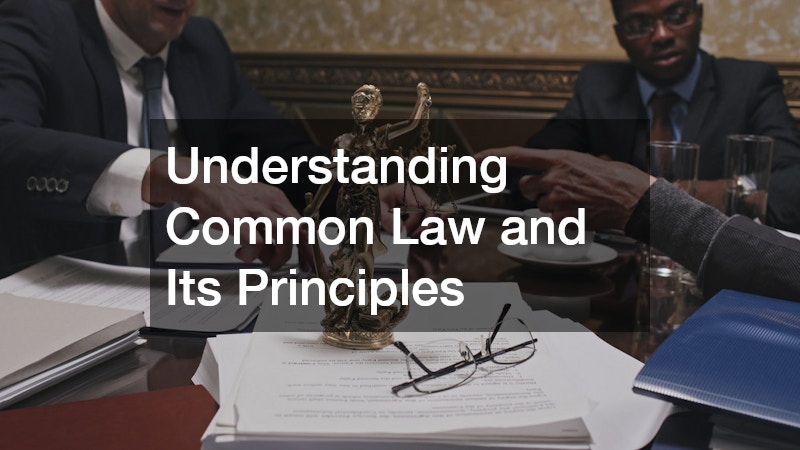
Navigating the legal system can often feel overwhelming, especially when the rules and procedures are complex and constantly evolving. Understanding the basics of law and the professionals who practice it is essential for anyone seeking legal guidance. Common law lawyers play a pivotal role in helping clients interpret statutes, resolve disputes, and ensure their rights are protected. Their expertise extends across multiple areas, making them indispensable for both individuals and businesses facing legal challenges.
For those unfamiliar with legal processes, it can be challenging to determine when to seek assistance and which type of lawyer is most appropriate. Common law attorneys offer guidance that balances general legal knowledge with specialized expertise, ensuring that clients can make informed decisions. Whether addressing family matters, property issues, or contractual disputes, understanding how these lawyers operate can prevent costly mistakes and provide peace of mind.
Legal matters often involve a variety of intricate details that can be confusing to navigate without professional guidance. From understanding procedural rules to evaluating the implications of legal documents, having knowledgeable representation can save time and prevent costly mistakes. By learning how common law attorneys operate, individuals can better appreciate the value of informed legal counsel and the importance of preparing for potential challenges.
Understanding Common Law and Its Principles

Common law is a legal system built on precedent and judicial decisions rather than codified statutes alone. It relies on the idea that prior court rulings can guide future decisions, creating a consistent and adaptable framework. Common law lawyers study past cases extensively to interpret how laws apply to current situations. This system emphasizes fairness, flexibility, and the practical application of legal principles, allowing courts to adjust interpretations based on evolving societal norms.
A deeper understanding of common law is crucial for estate planning, as this area often involves navigating complex property and inheritance rules. Common law attorneys help clients establish wills, trusts, and other arrangements that comply with both legal precedent and current regulations. By analyzing prior court decisions and applying them to individual circumstances, these lawyers ensure that estate plans are robust, legally sound, and tailored to the client’s needs.
Common law is rooted in centuries of judicial decisions, making it a dynamic system that evolves with societal changes. Unlike strictly codified legal systems, it allows courts to interpret laws in ways that reflect contemporary standards and values. This adaptability ensures that legal principles remain relevant and responsive to emerging issues.
The Role of a Common Law Lawyer
Common law lawyers serve as advisors, advocates, and negotiators, representing clients in various legal matters. Their role goes beyond simply interpreting laws—they provide strategic guidance, anticipate potential issues, and help clients achieve favorable outcomes. By understanding both statutory requirements and case law, they bridge the gap between theoretical legal principles and practical solutions.
In cases requiring the assistance of a bankruptcy attorney, common law attorneys play a critical role in guiding clients through financial restructuring and debt resolution. They assess the client’s financial situation, explain legal options, and represent their interests in court proceedings. Their knowledge of common law principles ensures that decisions align with precedent, protecting clients from future legal complications and helping them rebuild financial stability.
In addition to representing clients in court, common law attorneys often provide preventive guidance to help avoid disputes before they arise. They may draft agreements, review contracts, and offer advice on legal obligations, all of which contribute to smoother interactions and more predictable outcomes.
Educational Requirements for Common Law Lawyers

Becoming a common law lawyer requires a significant commitment to education and training. Most lawyers must complete an undergraduate degree, followed by law school, where they gain a deep understanding of legal theory, courtroom procedures, and analytical reasoning. Beyond formal education, aspiring lawyers often engage in internships, clerkships, and practical exercises to develop real-world experience that prepares them for complex cases.
For those pursuing a career as an injury lawyer, understanding common law principles is particularly important. These lawyers must navigate personal injury claims, liability issues, and precedent-setting court decisions, which often demand a sophisticated grasp of case law. Educational preparation ensures they can analyze prior rulings, apply legal strategies effectively, and advocate successfully on behalf of clients who have suffered harm.
Beyond formal schooling, aspiring lawyers frequently engage in ongoing education throughout their careers. Continuing legal education programs and specialized training help them stay current with changes in statutes, regulations, and case law, ensuring that their knowledge remains accurate and applicable.
Key Skills and Competencies Needed
Successful common law lawyers possess a combination of analytical, interpersonal, and problem-solving skills. They must be able to interpret statutes, evaluate case precedents, and communicate complex legal concepts in ways that clients can understand. Attention to detail, critical thinking, and negotiation skills are essential for guiding clients through disputes and legal challenges efficiently.
When working with a life insurance company, common law attorneys demonstrate these skills by reviewing policies, resolving claims, and ensuring that clients receive benefits to which they are entitled. Understanding both contractual language and prior case law allows them to address discrepancies or denials effectively. By applying these competencies, lawyers help clients navigate intricate legal landscapes while protecting their rights and interests.
Emotional intelligence is another critical skill for common law lawyers. Understanding the concerns, motivations, and perspectives of clients allows them to communicate effectively and develop strategies that align with both legal requirements and the client’s goals.
Typical Cases Handled by Common Law Lawyers

Common law lawyers address a wide variety of legal issues, ranging from civil disputes to contractual matters and family law cases. Their work often involves litigation, negotiation, and providing advisory services to prevent future legal conflicts. By relying on precedent, they can predict potential outcomes and guide clients toward decisions that minimize risk and maximize legal protection.
In situations involving a bail bond, common law attorneys assist clients in understanding the legal process, arranging release conditions, and advocating for fair treatment in court. They interpret common law principles to ensure procedures comply with legal standards and that clients are adequately represented. Their guidance can significantly impact the speed and success of the resolution, demonstrating the practical importance of common law expertise.
Many cases require careful negotiation and mediation before reaching the courtroom. Common law attorneys often work to resolve disputes outside of litigation, which can save clients both time and resources while fostering mutually agreeable solutions.
How to Find a Qualified Common Law Lawyer
Finding a qualified common law lawyer requires careful research and consideration. Clients should evaluate experience, reputation, and specialization to ensure the lawyer can handle their specific legal needs. Referrals, online reviews, and professional directories are useful tools for identifying reputable lawyers who are knowledgeable in common law principles and skilled at navigating complex legal matters.
For individuals seeking a bondsman, common law attorneys can provide guidance on selecting professionals who meet legal requirements and maintain ethical standards. They help clients verify credentials, understand contractual obligations, and ensure that agreements comply with precedent and regulations. This proactive approach reduces the risk of complications and ensures that clients work with competent, trustworthy legal and financial partners.
Researching a lawyer’s past cases and reputation within the legal community provides valuable insight into their capabilities. Personal interviews or consultations can also help clients assess compatibility and communication style, ensuring a productive working relationship.
Costs and Fees Associated With Common Law Services

The costs of hiring common law lawyers can vary widely depending on the complexity of the case, the lawyer’s experience, and the location. Many lawyers charge hourly rates, while others offer flat fees for specific services. Understanding potential expenses in advance allows clients to budget effectively and avoid unexpected financial burdens during legal proceedings.
When dealing with a jewelry buyer, common law attorneys can help clients understand transactional fees, ensure fair pricing, and confirm that agreements are legally binding. Their expertise ensures that financial interactions comply with common law standards and protect clients from disputes. By clarifying costs and responsibilities upfront, lawyers facilitate smoother transactions and reduce the potential for legal conflicts.
Understanding billing structures is essential to avoid surprises. Some lawyers may offer flexible payment arrangements, sliding scales, or contingency agreements, making legal services more accessible while aligning incentives with client outcomes.
Differences Between Common Law and Civil Law Lawyers
Common law and civil law systems differ fundamentally in their approach to legal interpretation and precedent. Common law attorneys rely heavily on judicial decisions and case history to shape outcomes, while civil law lawyers focus more on codified statutes and written codes. Understanding these differences is important for clients seeking the appropriate legal representation for their needs.
For those involved in selling gold, common law attorneys can clarify how transactional regulations, prior case law, and statutory rules intersect. They advise clients on legal obligations, potential liabilities, and best practices, ensuring that every transaction adheres to both common law principles and current legislation. Their guidance helps prevent disputes and protects clients’ interests in complex financial interactions.
The distinction between legal systems often affects procedural rules, evidence requirements, and case outcomes. Familiarity with these differences allows clients to approach legal matters with a better understanding of what to expect in terms of timelines and judicial interpretation.
Common Challenges Faced by Common Law Lawyers
Common law attorneys often encounter a variety of challenges in their practice, ranging from evolving legislation to complex case law that may conflict with prior decisions. Managing multiple clients, meeting strict deadlines, and staying updated on precedent are all part of the daily demands of this profession. Effective problem-solving and adaptability are essential to ensure that clients receive accurate and timely legal advice.
In matters involving a pawn shop, common law attorneys may face challenges related to property disputes, contractual agreements, and regulatory compliance. They must interpret prior rulings and statutory requirements to resolve issues efficiently while protecting client interests. By applying their knowledge of common law principles, these lawyers can anticipate obstacles and provide strategic guidance to navigate legal complexities successfully.
Lawyers also navigate ethical considerations, balancing their duty to advocate for clients with the responsibility to maintain honesty and integrity. These challenges require careful judgment and a commitment to professional standards.
Tips for Working Effectively With a Common Law Lawyer
Working effectively with a common law lawyer requires clear communication, realistic expectations, and a proactive approach to sharing information. Clients should provide all relevant documentation, ask questions to clarify legal strategies, and maintain open lines of communication throughout the case. This collaborative approach ensures that lawyers can provide the most accurate advice and represent clients effectively.
Maintaining organized records, documenting correspondence, and tracking deadlines can significantly enhance collaboration. Proactive engagement helps lawyers provide timely advice and prevents miscommunication that could delay case resolution.
For those seeking a disability service, common law attorneys can guide clients through claims, appeals, and legal requirements with greater efficiency when collaboration is strong. Understanding the procedures, providing necessary evidence, and discussing potential outcomes openly allows the lawyer to advocate successfully. This partnership helps clients navigate challenges while ensuring that their rights and interests are fully protected under common law principles.
Understanding the Importance of Common Law Lawyers
Common law lawyers serve as essential guides through the intricate landscape of legal issues, combining their expertise in precedent, statutes, and client advocacy. From estate planning to complex financial and property matters, their role ensures that individuals and businesses can navigate legal challenges with confidence. Understanding their responsibilities, skills, and the types of cases they handle provides clarity for anyone seeking legal support.
By working with a knowledgeable common law lawyer, clients benefit from strategic advice, protection of their rights, and practical solutions tailored to their unique situations. Whether dealing with financial transactions, personal claims, or regulatory matters, these lawyers apply common law principles to achieve fair and legally sound outcomes. Recognizing their value allows individuals to make informed decisions, avoid potential pitfalls, and secure the guidance necessary for legal success.
The work of common law attorneys contributes not only to individual cases but also to the broader legal system. By interpreting precedent and influencing future rulings, they help shape the evolution of law, ensuring that justice remains fair and consistent for all parties involved.



